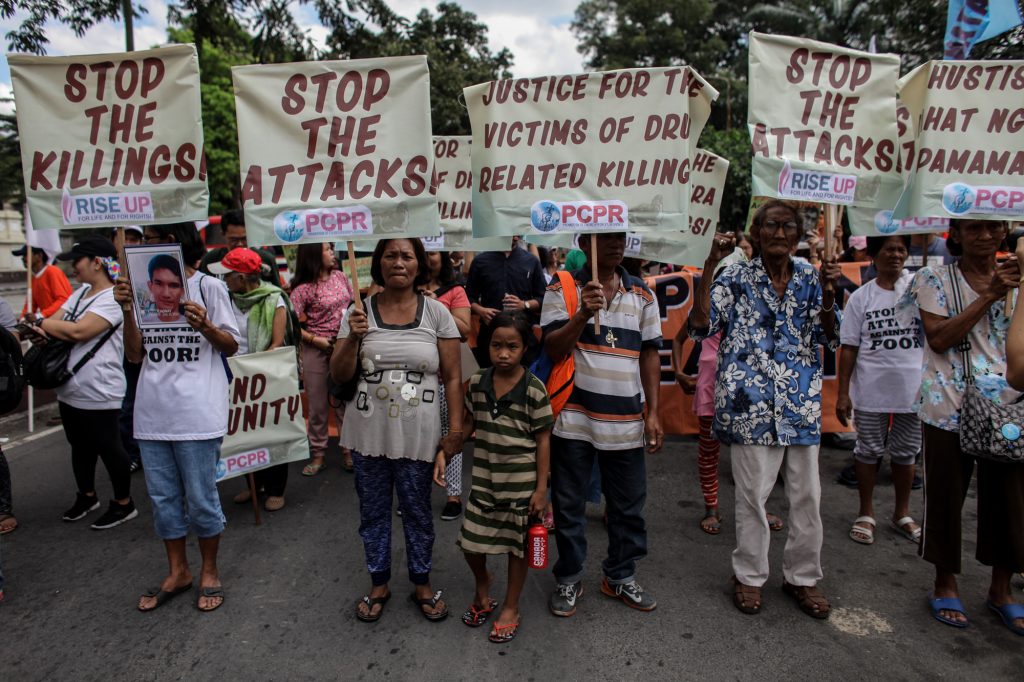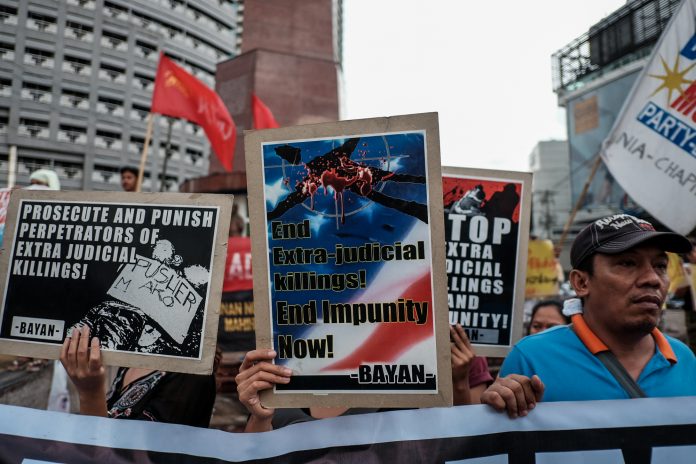Activists and human rights groups expressed dismay over the Philippine government’s response to calls in the United Nations for a deeper and independent investigation into alleged human rights abuses in the country.
The UN High Commissioner on Human Rights, Michelle Bachelet, called for the investigation during the start of the 44th session of the UN Human Rights Council in Geneva, Switzerland, on June 30.
In her report to the UN body, Bachelet cited the spate of drug-related killings in the Philippines to back claims of systematic, widespread, and ongoing human rights abuses in the country.
Philippine Justice Secretary Menardo Guevarra, however, responded that the anti-illegal drug campaign of the government has the strong support of the people.
“As a democracy, we must continue on a path that has the public’s unflagging support of the people,” he said.
Guevarra assured that the government is looking into the 5,655 anti-illegal drugs operations that reportedly resulted in deaths.
He said an inter-agency panel has been reviewing the police operations.
“The commitment has been firm and unwavering,” he said in his speech before the UN body through video.
“Claims that there is impunity or near impunity in the country find no anchor in a system that provides every avenue to examine, establish, and pursue a claim of wrongdoing by a state-actor,” said Guevarra.
‘Reasonably cynical’
Faith-based groups and human rights activists, however, said they “can’t help but be reasonably cynical” about the statements made by the Justice Secretary.
“The pledge and comments, though now delivered in more sober and studied tones, appear to be damage control to save [the administration’s] international reputation,” read a statement from the Ecumenical Voice for Human Rights and Peace in the Philippines.
The group said Guevarra’s “saccharine statements that appease widespread condemnation” have become “soporific in the face of previous experience and present realities.”

Ecuvoice said the government cannot just “throw all consistent and persistent accounts of violations and frustrations with domestic remedies.”
Lawyer Rommel Bagares described the “investigation” of the government’s inter-agency panel as a “delaying tactic.”
“It doesn’t mean much, really, except to delay the International Criminal Court investigations with no real intention to prosecute,” he said in an interview with LiCAS.news.
The ICC is set to decide this year if it will conduct formal investigations on the alleged human rights abuses committed in the Philippines.
“The government can’t ignore [the killings] any longer given the scale of the UN involvement,” said Bagares.
“The pressure is forcing the government to try to forestall the ICC investigation,” he added.
The lawyer said he expected “additional token prosecutions” in the coming days, “but 5,000 cases is a large number.”
Bagares said the only “token prosecution” the Justice department has done so far is that of the killing of 16-year old Kian Delos Santos who was shot by policemen.
“If any, [the inter-agency panel] appears to be yet another layer to bodies that should have done their job a long time ago,” said the lawyer.
Human rights commissioner Karen Gomez Dumpit said although government action came four years later, “it’s never too late to change course.”
She said other mechanisms, like the ICC, the UN treaty bodies, and the Human Rights Council process, “will continue to run its course.”
“The government and the authorities responsible must face the consequences of their action,” she told LiCAS.news.
Human rights groups said that they are “cautiously hopeful” as they expressed support for Blachelet’s recommendations.

Appeal for international support
Several church leaders this week called on the international community to pressure the Philippine government to put an end to the drug-related killings and to hold the perpetrators accountable.
Bishop Arturo Bastes, retired prelate of Sorsogon, said the UN report event should “spark a strong outcry and anger from the international community” and should start “a global inquiry.”
The prelate said the Church must fulfill its “prophetic duty” to denounce all kinds of human rights violations and stand against killings.
He urged the Catholic bishops’ conference to issue a statement support Bachelet’s report. “We cannot allow the government to simply kill people without due process.”
Bishop Jose Elmer Mangalinao of Bayombong said the Church “continues to lend our voice to denounce abuses and impunity.”
He said that while the Church is “neither part of any movement nor affiliated with any group,” the guilty should “pay for their crimes (so that) the victims may obtain justice.”
Bishop Broderick Pabillo, apostolic administrator of the Archdiocese of Manila, said the public should make use of Bachelet’s report to call for accountability.
The prelate expressed doubt whether the government would allow international courts and experts into the country to conduct any investigation.
Bishop Reuel Marigza of the National Council of Churches in the Philippines noted that many church people have also become victims of state-sponsored attacks.
“Most of the church people targeted are those primarily fulfilling the Christian mandate and mission of ministering to the poor and the marginalized,” he said.
He said Bachelet’s report could summon “the full protection and enjoyment of rights for the people” if the member countries of the council would “seriously act on the report.”
During the council’s opening session on June 30, the Philippine government said there is “no reasonable basis to allege impunity or lack of accountability for human rights violations.”
Mark Saludes contributed to this report









